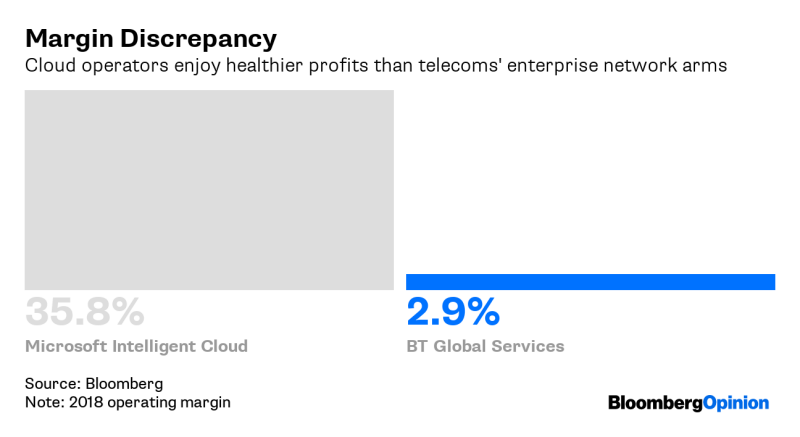(Bloomberg Opinion) — 5G networks will allow vast gobs of data to be transmitted at great speeds. And more data usually means more money for mobile carriers like Deutsche Telekom AG and AT&T Inc. But there’s a hitch. Cloud giants such as Amazon.com Inc., Alphabet Inc. and Microsoft Corp. are lurking.
The new tech enables ever more computational decision-making to be carried out by powerful processors sitting in the cloud. But when even a few milliseconds of lag can be a problem – as might be the case with high-frequency trading or connected factories – it’s worth trying to slash the time it takes to reach a cloud server.
That’s why the cloud giants are pushing what’s known as edge computing: where cloud functions run on servers that are physically closer to the end user, thereby cutting the distance to a computer making a given decision. They’re at the “edge” of the network. It’s a feature of the distributed cloud, where different functions are distributed across different parts of a network.
For telecoms firms that could be a problem. They’re terrified of spending hundreds of billions of dollars on upgrading their networks, only to become the providers of dumb pipes exploited by technology behemoths, and miss the most profitable opportunities the investments could generate. They don’t want a repeat of WhatsApp, whose free messaging platform gobbled up carriers’ SMS revenues.
The main cloud providers – Amazon Web Services, Microsoft Azure, Google Cloud and Alibaba Group Holding Ltd. – have a headstart when it comes to exploiting these opportunities. They have huge customer bases and developer ecosystems, in addition to their existing hordes of servers. In short, they have scale.
It would therefore be foolish for a telco to try to build a cloud offering to rival that scale, according to Nick McQuire, head of enterprise research at CCS Insight. They seem to recognize this, and are instead trying to ensure they’re the gatekeepers for their customers’ relationships with the cloud operators. Unfortunately for the network firms, the lock they have on those relationships can be tenuous.
There are different ways carriers can try to control them. Just this month, Spain’s Telefonica SA announced it would sell Google Cloud solutions globally. Alone, that’s unlikely to generate much profit. But by inserting themselves into the transaction, they hope to be in prime position to offer additional lucrative services that run on a third party’s cloud. And when it comes to small- and medium-sized enterprises, network firms’ extensive local teams can offer comprehensive solutions. It’s less scalable than what the cloud operators do, but it’s still an opportunity.
Others such as France’s Orange SA think that owning the cybersecurity layer is the best way to manage the process. That encryption key ensures they control enterprise customers’ cloud access, also making it easier to sell value-added services.
Both approaches are a gamble. Cloud providers have their own cybersecurity solutions, for one. Convincing customers that a carrier can do it better might be tough.
Increasingly, the operators have little choice. The likes of Amazon and Google are proactive in creating demand for their products. Their customers then turn to their telecom providers and request the cloud giants’ services. That all but forces them to play along.
Consider Google’s new Netflix for games, Stadia. For a subscription fee, starting in November users can access a bevy of titles running on cloud servers rather than their own computers. They’ll be able to play on a computer more than twice as powerful as Sony Corp.’s Playstation 4 console using just a cellphone, which becomes little more than a screen and a controller. And since the data is never exposed to the public internet, carriers’ importance is diminished.
A carrier who can boast about Stadia’s performance on its network might use it as a tool to win customers. The best gaming experience will have no perceptible lag, so the closer Stadia’s servers are to the user, the better.
Amazon and Microsoft’s gambits, which are called AWS Outposts and Azure Stack respectively, have similar placement goals. While not yet widely available, they comprise server boxes which sit on customers’ premises – factories, oil rigs or offices – and provide a hybrid of local and cloud computing.
The race to the edge really does risk turning the network operators into providers of dumb pipes: enterprise customers’ data enter the network via AWS Outpost at one end, and travel to and from centralized servers without being exposed to the public internet, remaining on a private network. It raises carriers’ risk of disintermediation – that they get all but shut out of the most lucrative parts of the cloud business.
Stadia is unlikely to eat the world any time soon, and Google is behind rivals Azure and AWS in many enterprise applications, which is where the real money lies. We’re in the very early days of this struggle.
But edge computing could turn into something of a Trojan horse for other cloud services. Carriers have a real challenge on their hands.
To contact the author of this story: Alex Webb at [email protected]
To contact the editor responsible for this story: Jennifer Ryan at [email protected]
This column does not necessarily reflect the opinion of the editorial board or Bloomberg LP and its owners.
Alex Webb is a Bloomberg Opinion columnist covering Europe’s technology, media and communications industries. He previously covered Apple and other technology companies for Bloomberg News in San Francisco.
<p class="canvas-atom canvas-text Mb(1.0em) Mb(0)–sm Mt(0.8em)–sm" type="text" content="For more articles like this, please visit us at bloomberg.com/opinion” data-reactid=”65″>For more articles like this, please visit us at bloomberg.com/opinion
©2019 Bloomberg L.P.













Add Comment